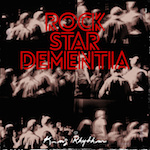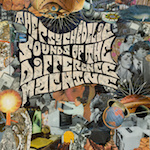|
5/15/14: Post hop Just as the practitioners of the Americana country sound are really just harkening back to the roots of rock and roll, over the last few years there's a strain of hip-hop that is rebounding back to its rock roots. Or rather, rebounding to rock before hip-hop was hip-hop. I qualify that because James Brown, Sly and the Family Stone and Parliament/Funkadelic (among many others) made music that fell outside any existing genres of their time--but that would easily fit within today's hip-hop "big tent."
Sounds dull? Like something you'd hear in school? Hardly. King Rhythm takes the bones of those sixties and seventies hits (a not inconsiderable amount of fun here is picking out exactly what song has been reassembled for a particular track) and lays down his typically mellow rapping style. There's an insouciance in the production--the samples are hilarious--that extends to the full album itself. The album is free at Bandcamp, which makes this an easy grab. I'm guessing one reason for the cheap price is the fact that every second is populated by copyrighted material. The licensing would simply be a nightmare. But if enforcement of copyright laws means missing out on the almost incomprehensibly astonishing "duet" that King Rhythm performs with Dylan's "It's Alright Ma" on "Slow Dement," well, I say fuck the laws. Art is all about recycling. Rock Star Dementia revisits the past with a loving and critical eye. We live in 2014, but there are plenty of reasons why there's something romantic about 1974 (or so). Sex, drugs and rock and roll were questioned on moral, not medical, grounds. Artists were ambitious and seen as godlike. Now everything is "safe" and even the biggest artists tweet. But ambition is still alive. Rock Star Dementia is proof. The Difference Machine takes a completely different approach. The "psychedelic sounds" are more often created in studio than sampled, but generally the point seems to be applying a psychedelic mindset to modern hip-hop. This is even more mindbending than it might seem. The Atlanta-based duo of DT (Dustin Teague of Clan Destined) and "Dr. Conspiracy" has created a sound that is completely modern in production, yet psychedelic in structure and periphery. There's plenty of reverb and distortion, but the beats are pure 2014. The songs utilize a regular pop construction, but they also appropriate the psychedelic penchant for tangents. All of which is to say that this sounds very Def Jux or (going further back) Wordsound, two New York-based labels that reveled in the experimental. And, yes, there's more than a hint of the Wu going on as well. Apart from a few tics in the rhymes, I would never have guessed this came from Georgia. But it is 2014, and Atlanta is definitely one of the global capitals of hip-hop. That something like the Difference Machine has popped out proves that the scene is fully mature. Rock and roll did not spring fully formed from the mind of Bill Haley (or Elvis, or Leiber and Stoller, or . . .). It grew organically from the intersection of black and white music in the south, and it had an audience of young people of all races. There are plenty of great rock and roll songs from the 40s, some of which sound pretty modern today. On the other hand, it's a long way from Big Mama Thornton to Slint, yet "rock and roll" is big enough to hold both. Likewise, hip-hop was around long before "Rapper's Delight" (listen to Ella Fitzgerald's "songbook" albums with Duke Ellington and you'll get chills), and hip-hop encompasses a similarly wide range of ideas and sounds. The history of hip-hop mirrors that of the history of rock and roll. Which only makes sense. Hip-hop is rock and roll, just a ways down the road. Hip-hop is as another intersection of black and white music, and it has an audience of young people of all races. In terms of music theory, there's more differentiation within what is commonly called rock or hip-hop than there is between the two "genres." When you get right down to the DNA, they're one and the same. King Rhythm and the Difference Machine get this. Their recent albums highlight and explore the connections between hip-hop and late 60s/early 70s rock--connections that aren't exactly intuitive. These albums make clear, however, that "new" music always builds on the past. Would Kanye be Kanye without opera? Of course not. The grandiose psychodramas that are his albums ought to be staged at the Met. The two albums reviewed here make an important point about the connections between supposedly antithetical styles of music. More importantly, these albums are a lot of fun to hear. Rock Star Dementia is a great party album, while The Psychedelic Sounds of the Difference Machine sounds great blasting out of car speakers. Their artistic pretension (and accomplishment) means they'll remain viable for a long time. Lots of folks say that rock and roll is dead. But rock and roll can never die. It simply changes costumes. Neither hip-hop nor rock are denigrated by uniting them under one banner. Humans have celebrated good music for millennia; that's one of the things that makes us human. And no matter what we call it, good music is good music. Rock and roll is dead. Long live rock and roll.
|
|
return to A&A home page

